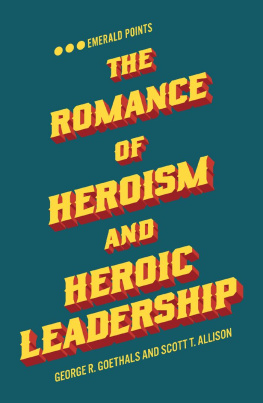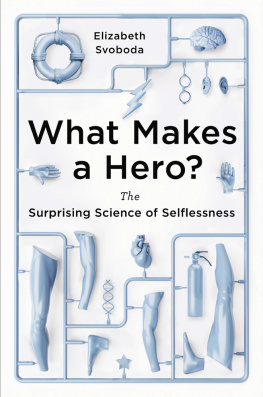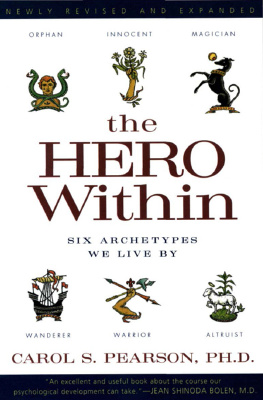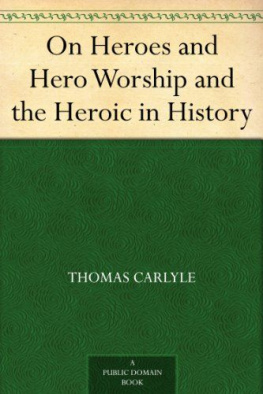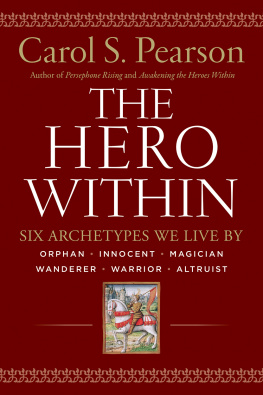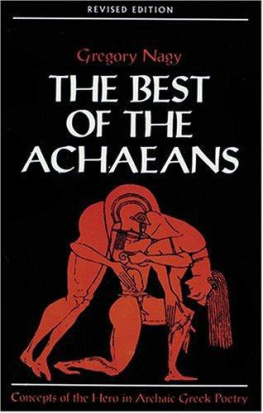To my mentor Richard Hoffman; my dear friend David Mattingly; and my mother Sylvia Ann Kendrick
Ackowledgments
This book would never have seen the light of day without the indulgence, encouragement, and assistance of students, colleagues, and friends. I am particularly grateful to all of the freshmen at UCLA who have taken my first year seminar on the heroic ideal in the West and afforded me the opportunity to develop and explore the ideas and themes at the heart of this work. Special thanks are also in order to the following individuals who read and edited various drafts of this books chapters, and provided me with thoughtful advice and criticismRichard Hoffman, Jon Friedman, David Mattingly, Dennis Claxton, Joseph Nagy, and Joe Menosky. And last but certainly not least, I wish to express my gratitude to the many peopleyou know who you are whose love and encouragement have sustained me through the six years of this project.
Introduction
Heroism and the Human Condition
There is a brief scene in Return of the Jedi, the third installment of George Lucas original Star Wars space opera, in which Luke Skywalkers droid companion, C3PO, relates to an audience of Ewok villagers some of the particulars of his human masters struggle against the evil Empires Darth Vader. The recounting of this tale takes place in a large firelit arboreal hall and is accompanied by some dazzling special effects, courtesy of the advanced digital circuitry of its android narrator. While C3PO describes space battles, breathtaking escapes, and light saber duels, the camera moves in on his attentive listeners, treating the film viewer to tight close-ups of wide-eyed children and their thoughtful, appreciative elders. As the scene draws to a close, it is evident to the movie audience that they are witnessing the birth of a heroic saga that will entertain and enlighten generations of this alien tribeas well as their counterparts in galaxies far, far awayfor centuries to come.
Mention is made of this particular scene because it underscores both the venerable nature and the enduring popularity of the heroic ideal in human culture. One does not have to be steeped in film theory and practice, for example, to realize that Lucas has inserted this episode in his movie for the purpose of alerting his audience to the fact that they are participating in a tradition that stretches back to pre-literate times. Just as bards and poets once recounted the deeds of extraordinary hunters and warriors to human bands huddled around nighttime fires, this scene reminds us that filmmakers now use the lexicon and technology of the cinema to recreate similar tales of heroism for a modern public huddled together in darkened movie houses around the arc lights of film projectors. Indeed, one of the most striking aspects of the heroic ideal is that some four hundred thousand years after the first appearance of thinking man on this planet, heroes and the tales of their adventures remain a constant of the human condition.
Lucas scene also highlights some of the reasons why our societies continue to embrace these extraordinary figures. The obvious enjoyment of the Ewoks, for example, underscores the fact that stories about heroes are usually ripping good yarns that allow their listeners to escape from the doldrums of their daily lives and vicariously enjoy unfamiliar experiences and emotions. It is also important to note, however, that in this scene the narrator, C3PO, is doing something more than merely recounting entertaining tales of Luke Skywalkers derring-do. He is also telling his audience a story about the perils of untrammeled power, the necessity of defending republican democracy, and the importance of loyalty, self-sacrifice, and public service. In doing so, Lucas android surrogate is reminding us that the tale of the hero is not merely a vehicle of escape but also a powerful heuristic in the search for answers to questions about lawful authority, right conduct and essential goodness. Indeed, from Homer to the present, individuals, tribes, movements, and nation states have all used the heroic ideal to propagate and perpetuate codes of moral conduct, religious beliefs and practices, and systems of economic, social and political control.
Thinking About Heroism
Given its persistence and utility as a source of education and acculturation, one would think that the historical development of the heroic ideal, as well as the ways in which human societies have exploited it, would be a subject of considerable interest among thinkers. With the notable exception of Thomas Carlyle and Friedrich Nietzsche, however, heroism is an idea that has been given surprisingly short shrift in the annals of modern intellectual history. To be sure, a number of folklorists, linguists, and cultural anthropologists have considered the hero in larger studies of myth, religion, and narratology, but by and large most scholars have avoided the subject, considering it to be grist better suited to the mills of poets, novelists, and filmmakers.
Such scholarly neglect was not always the case. Throughout most of Western history, intellectuals and the educated lay public tended to attribute all progress in human affairs to the ideas and deeds of a handful of extraordinary individuals with exceptional abilities. If someone were interested in understanding any given historical moment and its accomplishments in art, science, and statecraft, it was commonplace to identify and assiduously study the actions of that periods heroic figures. Indeed, there is a whole tradition in Western history of dividing the past into a succession of ages, each one dominated by an archetypal hero, such as Caesar, Louis XIV, or Napoleon Bonaparte, whose ambitions and intelligence were believed to have dominated their time period. Concurrently, if one were doing a study aimed at explaining some kind of social phenomena, the tendency was to look at the patterns of behavior on the part of certain key players in the history of religion, politics, commerce, and war. Niccol Machiavelli, for example, framed his discourses on the acquisition and uses of power around the lives and actions of such great men as Alexander of Macedon, Augustus Caesar, and Lorenzo de Medici. Even revolutionaries bent on affecting a complete break with tradition still found it expedient to study and emulate the deeds of heroic rebels and reformers from the past. A case in point was the American constitutional convention where many of the founding fathers carried about copies of Plutarchs Lives of the Noble Greeks and Romans and are reputed to have derived considerable comfort and inspiration from the biography of the great Athenian lawgiver Solon.
The twentieth century saw a marked decline in this kind of hero worship. In part, this development can be attributed to the swath of bloodshed and terror that followed in the wake of a slough of self-styled heroesMussolini, Hitler, Stalin, and others of their ilk who established fascist and communist dictatorships throughout much of the West during the first half of the century. It was not lost on people, both at that time and later, that these figures and their followers justified all manner of murder and mayhem on the basis of their claim to be latter-day knights-errant, chosen by providence or the laws of historical materialism to defend, purify, and ultimately transform their societies into either racial or classless paradises. The hot and cold wars that resulted from the actions of these dictatorships further contributed to a widespread feeling among intellectuals that heroes and ideals of heroism were ultimately elitist, undemocratic, and dangerous atavisms.


